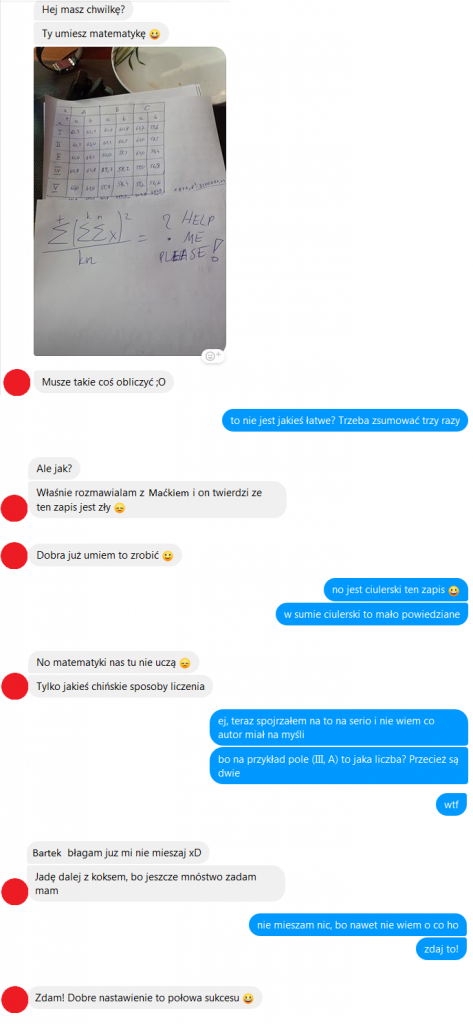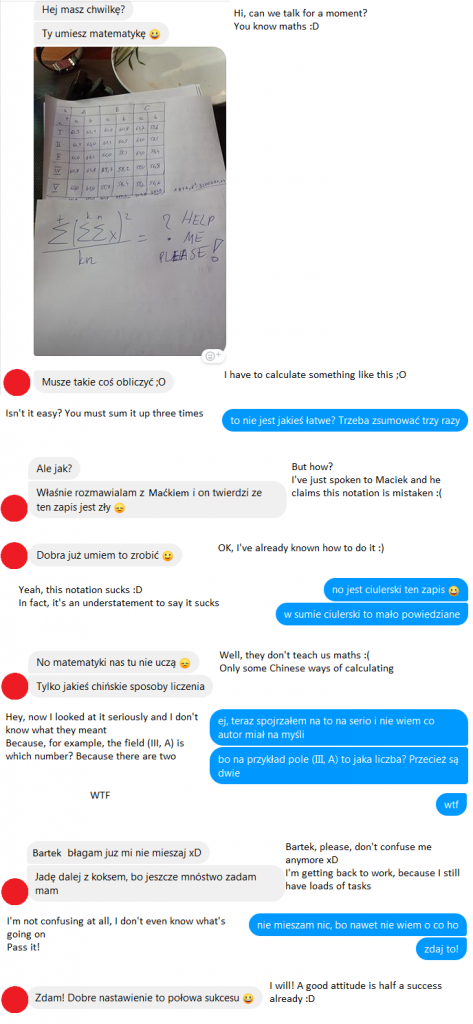Welcome to the first article from „Learn Polish through private messages” series. In fact, I don’t know if it’s a series. It all depends on you. If you like the concept, I will continue.

The idea is to show you private conversations from Facebook/ Messenger between two Polish native speakers. This way I’m guaranteeing that you read living language only. First I’d like to introduce the chat and later we’ll discuss it. So click, read it, try to understand and then check with me.
The first very noticeable thing is that very often Polish marks are missing. For example „Musze takie coś obliczyć” should be „Muszę takie coś obliczyć”. It is very common that the Polish type without Polish letters. The second very noticeable thing are commas which are missing very often too. Punctuation mistakes are very common in every language.
„Takie coś” — it means „something like this”. It’s a very common colloquial expression. Sometimes written (and pronounced) as „takie cuś”. „Obliczyć” — it means „to calculate” and it’s perfective. The imperfective form is „obliczać” or „liczyć”.
„To nie jest jakieś łatwe?” — „Isn’t it some kind of easy?”. This is a slang way of asking „To nie jest łatwe?”. „Jakieś” is in the neuter form because it’s referring to „to”. Another example of this construction, with a different subject, would be: „On jest jakiś głupi” – „He’s some kind of stupid”.
„Zsumować” means „to sum up”, it’s perfective and its imperfective form is „sumować”.
„On twierdzi, że ten zapis jest zły” — let’s consider this sentence. „Twierdzić” means „to assert”, „to claim” and it’s imperfective. Its perfective form is „stwierdzić”. „Zapis” means „notation”. Another word in Polish which means „notation” is „notacja”. „Zapis” has got another meanings connected with writing down, signing in, but they’re very specific, so I’ll leave them.
The basic meaning of „zły” is „bad”, but it also means „wrong” and here it’s „wrong”. The whole sentence means „He says that this notation is wrong”.
Then we can see „dobra” which begins the next sentence. „Dobra” is feminine singular form of „good”. But in colloquial speech „dobra” means „OK, fine” and it’s an exclamation. Another examples would be: „Dobra, widzę” — „OK, I can see it” or „Dobra, idziemy” — „Alright, let’s go”.
„No jest ciulerski ten zapis”. First of all, we should identify what’s the subject and what’s the verb. The easier (and puctually correct) way of writing it would be: „No, ten zapis jest ciulerski”. „No” means „yeah” here. „Ciulerski” is a slang word which means „damn bad”.
„W sumie ciulerski to mało powiedziane” — this is a very interesting sentence. „To mało powiedziane” means „it’s an understatement”. So „ciulerski to mało powiedziane” means „it’s an understatement to say that it’s damn bad”. „W sumie” here means „Actually”. We use it to correct something after having considered pros and cons. The person here first wrote that this zapis (notation) jest ciulerski (damn bad). But after a while they corrected themselves: „Actually, it’s an understatement to say it’s damn bad”. So he finds this notation very, very bad.
„No matematyki nas tu nie uczą” — let’s write it in an easier way: „No, nie uczą nas tu matematyki”. The order changed and so the stress. First the stress was on „nie uczą”, in the second version it’s on „matematyki”. Here „no” means „well”. The sentence means „Well, they don’t teach us maths here”.
„Tylko jakieś chińskie sposoby liczenia” — once again we’ve got „jakieś” which means „some”. „Liczenie” means „calculating”. It comes from „liczyć” which means „to count” or „to calculate”. This is its imperfective form and the perfective form is „policzyć” or „obliczyć”. The sentence means „Only some Chinese ways of calculating”. Why does the person says it’s Chinese? They’re referring to the strangeness of these ways of calculating. They want to say these methods are out of this world, are very exotic. This works only if you add „jakieś” before „chińskie”, because „jakieś” indicates the indefinition. Without „jakieś” it wouldn’t sound as if these were „strange” methods.
„Ej, teraz spojrzałem na to na serio i nie wiem co autor miał na myśli” — yet another one interesting sentence. „Ej” means „hey”, it’s a colloquial word used to calling attention. „Na serio” means „seriously” and it’s a colloquial expression. „Mieć na myśli” means „to mean”. We can ask for example: „Co masz na myśli?” — „What do you mean?”. This sentence altogether means „Hey, now I looked at this seriously and I don’t know what the author meant”.
„Przecież są dwie” — it means „All in all, they’re two of them”. „Przecież” is a commonly used word after which we present the reason of what we said before. Here, the person didn’t know what author meant and then showed the reason why.
„Bartek błagam juz nie mieszaj” — correctly, it should be „Bartek, błagam, już nie mieszaj”. „Błagać” means „to beg” and it’s imperfective. The perfective form is „wybłagać”. „Mieszać” means „to mix”, but colloquially it’s got the meaning of „to confuse someone”. We say „mieszać kogo? Co?”. „Nie mieszaj” means „Don’t confuse [me]”. „Mieszać” is imperfective, its perfective form is „zamieszać” or „pomieszać”. „Już” here doesn’t mean „already”. It introduces, however, a more impatient tone of the request. „Nie mieszaj” means „Don’t confuse”, but „Już nie mieszaj” means „Stop confusing”.
„Nie mieszam nic, bo nie wiem o co ho” — what’s the meaning of „nic” here, if we can confuse a person, not a thing? Why not „nikogo”? Because „nic” here means „at all” and it’s used this way in colloquial speech. „O co ho” is a slang way of saying „O co chodzi” and it means „what’s going on” or „what it’s about”. If someone says something out of context, you can ask „O co chodzi?” — „What is the context, what are you referring to?”. „O co chodzi” is a colloquial construction too. The whole sentence means „I’m not confusing at all, because I don’t know what’s going on”.
„Jadę dalej z koksem, bo mnóstwo zadań mam” — that’s a great sentence. „Jechać dalej z koksem” is a very common colloquial expression which means „to continue working” or „to go forwards with work”. Literally means „to go forwards with coal”. No, it doesn’t make any special sense. „Mnóstwo” means „a lot”. Originally, the person wrote „zadam”, not „zadań”, but it’s a typo — „literówka” in Polish.
„Zdaj to!” – this is the imperative and it means „Pass it!”. It’s about the upcoming exam.
„Dobre nastawienie to połowa sukcesu” – this is a common saying. It means „Good attitude is half of the whole success already” or, more idiomatically, „A good attitude is half the battle”. A very optimistic thought to have for the start of some task.
If you’ve got any further question — ask them here! Please, let me know how you liked this lesson. At the bottom you’ll find complete translation of this chat.
Comment the post here or on Facebook.
The image comes from flickr.com.

